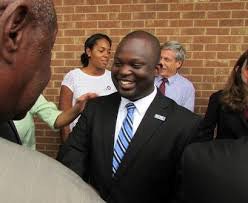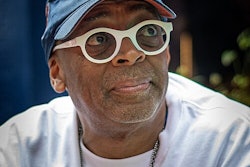 Montravias King said that his victory helps bolster college student interest in the political process and to not be discouraged when they feel like politicians do not represent them.
Montravias King said that his victory helps bolster college student interest in the political process and to not be discouraged when they feel like politicians do not represent them.When North Carolina Republican Gov. Pat McCrory signed into law one of the nation’s most sweeping Voter ID laws last August, a flurry of major court battles began over voting rights. One of them was led by 22-year-old Elizabeth City State University (ECSU) political science student Montravias King. He challenged the dormitory residency requirements since the Pasquotank County Elections Board stipulated that a dormitory could not be considered a permanent residence for the purposes of voting.
The North Carolina Board of Elections then ruled last month that King, who lives and plans to remain living in an ECSU dormitory, did, in fact, meet the residency requirement and was eligible to run for the municipal council. The ruling could have prevented all college students who lived on campus in North Carolina from voting. Optimism and persistence led to King’s decisive win, obtaining the city council seat last week.
King said that his victory helps bolster college student interest in the political process and to not be discouraged when they feel like politicians do not represent them.
“College students need to vote, especially at the local level, so that they can elect representatives that serve and protect their issues,” said King, who was scheduled to speak about voter suppression Thursday at a non-governmental organization (NGO) conference sponsored by the African Methodist Episcopal (AME) Women’s Missionary Society at the United Nations in New York.
As councilman, one of King’s first orders of business is to further establish and cultivate the relationship between ECSU and the city. He indicated that “the image of the university is not what it could be, and if done well, that can change, and Elizabeth City can become a true college town with a positive impact on economic development and jobs.”
King explains his sense of urgency to make change. “A high poverty rate and one of the highest per-kilowatt electricity rates in the state is unacceptable.”
King remained confident and self-assured that he was going to win the historically Republican Ward 4 election, especially after knocking on more than 350 doors in one campaign stint.
“Speaking to people was the most fun,” he said. “Explaining that I was there to serve them, and after witnessing the community reaction to a fresh face they said they needed, motivated me to keep going.”
As a current ECSU student, King said that “the political science program is now a draw because it produces leaders” and is extremely grateful for the support from the professors, advisers and mentors at the historically Black institution. Enrollment in the program is down and is facing cuts, thus could “possibly be eliminated if that doesn’t change in the next two years.”
One other mentor that King feels deserves praise is North Carolina Democratic State Senator Don Davis who represents Green, Lenoir, Pitt and Wayne counties. King said that Davis was “instrumental in the success of my first campaign and continues to act as my mentor.”
Davis was impressed with his determination throughout the campaign and ability to maintain a full-time schedule at ECSU.
“Montravias never fails to amaze me,” said Davis. “He was able to successfully manage national media coverage, an appeal to the N.C. State Board of Elections, school assignments and running a very effective campaign all at once. … It should be promising for all generations to see young adults such as Montravias engage in public policy and to help shape the communities that impact our families and way of life.”
King’s campaign identified challenges facing young and minority voters. He said that “they should participate in every election, especially at the municipal level since college students directly contribute to the cultural and financial life of the city where they choose to study.” King estimates that “the overall annual economic impact of Elizabeth City State University on the region is $150 million, while the impact on the city itself is at $40 million.”
Wherever college students are studying, King said, they should “be the change they want to see” in their communities.


















